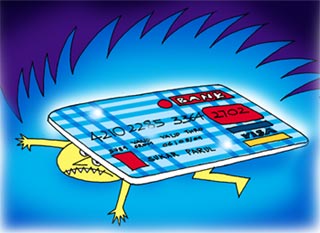
 he voice was music to your ears.
he voice was music to your ears.
You called in to say that you just don't have the money to pay your credit card bill this month.
"Don't worry," the helpful customer service executive cooed. "Just pay five percent. We shall carry forward the rest to the next month."
Well, congratulations. You just began an intense love affair with your bank.
They are going to love you even more than you love them. Want to know why?
Because, now, finally, they can make a nice packet on you.
On all the money you owe them, they are going to charge you 2.95 percent per month. That works out to 35.4 percent per annum.
What's more, you even start paying interest on any purchase you make. Buy a book, and you have to pay interest on this amount.
What's the way out?
You have two options.
1. Stop using the card.
The moment you run short of funds and have to revolve credit, stop using your card.
In fact, if your amount is huge, leave home without your card. Use cash or even another card till you clear your debts on the one you are revolving on.
Use the card only if you are certain you will clear all debts by the next month.
2. Switch credit cards.
All banks want people to take their credit cards.
And, one way they try to get your attention (and loyalty) is by offering what they call 'balance transfer':
~They pay back all the money you owe your bank on your card.
~All the money you owe the bank is transferred to them.
~They then charge you a lower interest rate on that amount so you end up paying less.
Assume that you are shifting to a card from Bank B from a Bank A card.
Bank B gives you a demand draft (in favour of Bank A) of the amount you owe Bank A.
You then need to make that payment to Bank A.
Until you get the demand draft or cheque, you continue making payments to Bank A.
When Bank A verifies the balance transfer (they will send you a statement to that effect), you stop paying them.
Now, how do you save?
Say you owe your bank Rs 25,000 on your credit card. And are paying 2.95 percent interest on it per month.
Let's say you opt for a balance transfer and are offered 1.65 percent for six months, during which time you are determined to pay up every single rupee (and not use the card at all).
Every month, you pay Rs 4,150 (for 5 months). In the last month, you pay Rs 4,250.
After six months, you will have totally cleared your debt.
You will pay Rs 1,099 as interest rate totally.
If you had stayed on with the earlier card, you would have paid Rs 2,060.
By switching cards, you saved Rs 961 on interest payment.
The savings may not appear to be much, but that is because you have been paying back a fair amount every month and not using your card at all.
If not, the lower interest rate would have made a bigger difference.
If you would like to see how much you can save, take a look at the simulator on the HDFC Bank web site: http://www.hdfcbank.com/creditcard/transferandsave/cc_btsimulator.asp
What you must know:
1.You can't stay with the same bank.
You will not be able to transfer credit from one card to another within the same bank.
To avail of the balance transfer facility, switch cards to another bank.
For instance, if you are revolving credit on the HDFC Gold Credit card, you will not be able to switch to the HDFC Silver Credit card. You will have to approach HSBC or ICICI Bank or any other card player.
2. Check if you have an account with the bank.
If you are switching your balance to a new card, the bank issuing that card may give you a better deal if you have an account with them.
Currently, HDFC Bank offers account holders just 1.45 percent per month to transfer balance to its Silver card (as against 1.65 percent for non-account holders).
3. There is a minimum amount.
The more you have in revolving credit, the more the banks will want you on board.
In fact, each bank will have a minimum amount, which you must be revolving.
Anything below and you will not be welcomed. To give you an indication, HDFC Bank currently asks for a minimum of Rs 7,500 (all cards) and Rs 20,000 (Gold card).
HSBC asks for at least Rs 10,000 for a Classic card and Rs 20,000 for the Gold.
Citibank takes a transfer for as low as Rs 2,500, while ICICI Bank beats them at Rs 2,000.
4. There are limits.
The amounts must fall within the credit limits of the new bank. Depending the type of card, the bank will give you a credit limit.
This limit can be enhanced once you have a relationship with the bank. They will look at your income, spending and payment pattern.
Before they enhance it, they will go by the limits they put on each card. Beyond the stated credit limit, you will not able to spend on your card. And, the amount you are revolving must be within this limit.
HDFC Bank does not allow the balance transfer to be more than 75 percent (International Gold), or 50 percent (International Silver) of its credit limit.
HSBC and ICICI Bank has it at 75 percent of the credit limit.
5. It's not forever.
Always check the tenure of the rate of interest. Sometimes, it is for just a month, sometimes six months. After the fixed time slot, the market rates of 2.95 percent per month are applicable.
6. Your card should not be brand new.
Some banks insist that your card is not just a month in existence. HSBC will take over the balance only if your card is at least six months old.
7. You will pay for it.
Nothing is free. You will have to pay the processing fee to avail of the new card. One-time transaction fees are also charged. For instance, Citibank charges 1.5 percent of the amount transferred or Rs 200 (whichever is higher, of course).
8. Speed up on your repayment.
Make paying back your loan your priority. You have a lower interest rate for a few months. Use it to your advantage.
Do not use the card at all.
What the banks will not tell you is that when you use your card, whatever you spend on will get an interest rate payment. This interest rate will be 2.95 percent and not the cheaper rate.
So who is offering what?
The market rate for revolving credit is 2.95 percent per month.
When banks try to woo you to transfer your balance to their cards, they offer a monthly interest rate in the vicinity of 1.75 percent. This is generally offered for six months, after which 2.95 percent is once again applicable.
~ Citibank: 1.75 percent per month. If you transfer Rs 25,000 or above, you get 250 reward points free. The bank is offering this till November 30, 2004.
For more information, please visit http://www.online.citibank.co.in/portal/citi_home_center.jsp
~ HDFC Bank: 1.25 percent per month (International Gold Credit card); 1.65 percent per month (other cards). It drops to 1.45 percent per month if you have an HDFC Bank account.
For more information, please visit http://www.hdfcbank.com/creditcard/transferandsave/CC_whatisbaltransfer.asp
~ HSBC: Zero percent per month. Interest rate valid for three months (not six). Instead of the minimum transfer amount of Rs 10,000, only Rs 3,000 is required.
The bank has not stated how long the offer is on for. It is only valid on the HSBC Classic credit card.
For more information, please visit http://www.hsbc.co.in/in/personal/cards/default2.htm
~ ICICI Bank: 1.75 percent per month (Blue and Silver cards); 1.50 percent (Gold Card).
For more information, please visit http://www.icicibank.com/pfsuser/cards/creditcard/cc_home.htm
~ Standard Chartered Bank: 0.99 percent per month. There are various options for 6/12/24/36 months.
While the web site says you can transfer your balance for an interest rate of 1.75 percent per month, a call to the 24-hour helpline will inform you which scheme is currently on.
For more information, please visit http://www.standardchartered.com/in/cb/creditcard/cardfeatures.html
~ State Bank of India: Zero percent per month. Interest rate valid only for 75 days, not six months. The bank offers this till November 30, 2004.
For more information, please visit http://ww.sbicard.com/sbi/balancetransfer.html







